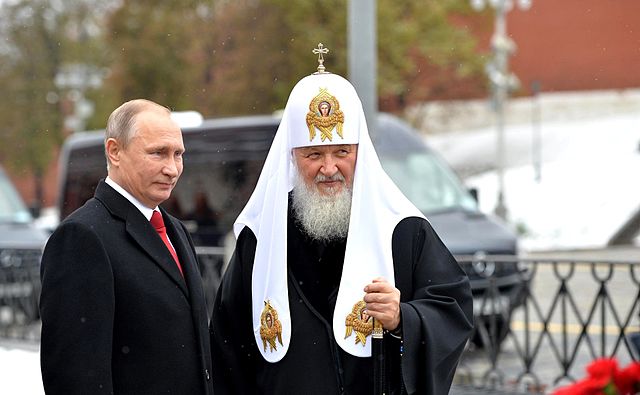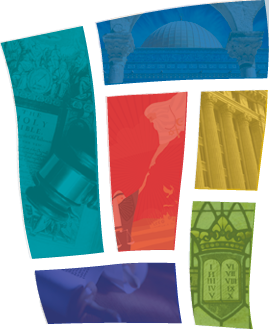
Religious Arguments and Political Goals Behind the Russian-Ukrainian War
Dmytro Vovk
Image: “Vladimir Putin and Patriarch Kirill on Unity Day 2016-11-04” by The Presidential of Russia Press and Information Office / Wikimedia
This article is part of our “Russia/Ukraine: Law and Religion Perspectives” series.
If you’d like to check out other articles in this series, click here.
I live in Kharkiv, a large city in eastern Ukraine right on the Russian border. Kharkiv is a totally Russian-speaking city and occupies a prominent place not only in Ukrainian, but also in Russian history and culture. It’s the city where one of the Russian Empire’s oldest universities was established, one of the greatest Russian artists Ilya Repin was born, and where the Nobel-prize-winning physicist Lev Landau lived and worked for several years. It’s the city living in the pages of literary works written by Anton Chekhov, Ivan Bunin, and Ilya Ilf and Evgeniy Petrov, authors of Twelve Chairs—probably the most popular Russian-language novel of the 20th century.
When Russia’s invasion of Ukraine started on February 24, 2022, my family and I relocated to a safer part of the city as our neighborhood was under permanent shelling since the very beginning of the war. Still, we had to go to the shelter each time we heard emergency sirens or simply sounds of exploding bombs. In the shelter my older daughter read to my younger daughter the funny poetry of Russian poet Samuil Marshak. While listening to her reading, I caught myself on an absurd thought: my Russian-speaking children had to hide in the shelter and entertain themselves by reading Russian-language poetry, because Vladimir Putin decided to destroy Russian-speaking Ukrainian cities in order “to protect the Russian-speaking population” in Ukraine.
While listening to her reading, I caught myself on an absurd thought: my Russian-speaking children had to hide in the shelter and entertain themselves by reading Russian-language poetry, because Vladimir Putin decided to destroy Russian-speaking Ukrainian cities in order “to protect the Russian-speaking population” in Ukraine.
This absurdity goes even further. Putin’s attack was blessed by Moscow Patriarch Kirill, although one third of Moscow Patriarchate’s parishes are located in Ukraine and the premises of several Moscow Patriarchate parishes have been already damaged or destroyed. The war that has already resulted in the Bucha massacre and other atrocities seem to be supported, or at least not objected to, by the majority of the Russian population despite the personal and cultural connections and relations with Ukraine and Ukrainians that many Russians have. Thus, the question arises of how Russian society can reconcile these spiritual, historical, and cultural ties with bombs being dropped on Ukrainian cities by the Russian army, and what is the role that religious arguments utilized by Putin or the Russian Orthodox Church play in this tragedy?
Rhetorical Device
In the literature one can find a distinction between the peripheral and central influence of religion in wars and violent conflicts. Elizabeth Clark and I have argued elsewhere that the Russian-Ukrainian conflict has manifested a more peripheral influence, which relates to the loyalties and identities of the players in the conflict, as opposed to a more central influence, which effects the political goals of combatant parties. We see that all parties in the conflict—Russia, Russia’s proxies in Donbas (so-called Donetsk and the Luhansk People’s Republics), and Ukraine—use religion to promote their own political agenda. However, a closer examination reveals that the core goals of the conflict are primarily geopolitical. Russia’s goal is to maintain control over Ukraine and even absorb it. Russia denies any Ukrainian statehood and nation, while Ukraine’s goal is to secure its independence and right to choose its own geopolitical vector.
This is not to say that this geopolitical logic is fully rational and based on any measurable goals such as military or economic security. The Russian president’s geopolitical considerations have less to do with real security concerns and more to do with Russian historical memory, the imagination of the Russian state and Russian “civilization,” and imperialism as a feature of the Russian political elites’ mind. Religion is just a part—and not even the most important part—of this picture in the sense that Putin uses religion as a rhetorical device to justify the war against Ukraine.
The Russian president’s geopolitical considerations have less to do with real security concerns and more to do with Russian historical memory…
For example, he justified the annexation of Crimea by referring to the fact that Crimea is a “sacred place” for Russia and Russians similar to the Temple Mount for Jews and Muslims. Also, in the 2000s the Russian Orthodox Church (ROC) has developed the religio-political doctrine of the Russian World (Russkiy mir) as a sphere of Russian political, cultural, and spiritual influence that includes Ukraine, with the political center in Moscow. This doctrine, as well as its secular versions claiming Russian exclusiveness and/or ethical superiority have become ideological pillars of the war as, in their logic, Ukraine’s European integration policies are an attempt to subordinate to the West the territory which Russian political and spiritual leaders consider as a part of the Russian World or even a part of Russia.
Political Goals
These religious doctrines and concepts were utilized to justify political goals that had already existed. An American historian of Ukrainian origin, Serhii Plokhiishows in his book The Last Empire: The Final Days of the Soviet Union that the secession of Crimea was discussed and promoted by Russian politicians and officials long before the Russkiy mir doctrine or the idea of the sacredness of Crimea was offered to the public.
Plokhii demonstrates that Russia’s territorial claims against Ukraine were first articulated at least in 1991, during the negotiations about the resolution of the Soviet Union. Russia’s first president Boris Yeltsin used these claims to strengthen its position in those negotiations. He made a statement about the possibility of the revision of Soviet republics’ borders. Plokhii cites Yeltsin’s press-secretary Pavel Voschanov who “recalled … that the contested areas included territories that had earlier belonged to Russia: the Crimea and the Donetsk region of Ukraine, Abkhazia in Georgia, and northern territories of Kazakhstan.”
It’s not hard to see that during the next 30 years Russia consequently attacked Georgia and Ukraine to impose its control over Crimea, Donbas, and Abkhazia. In addition, several Russian MPs raised territorial claims over Kazakhstan. This can probably explain something about the Kazakh political elite’s hesitance to support Russia’s invasion these days.
The War and Grass-Root Discourse
Elizaveta Gaufman, a German and Russian political scientist, analyzed Vkontakte, the most popular Russian social network, in order to understand how ordinary Russian people perceive and interpret this conflict. She concludes that, within this popular sphere, the conflict lacks strong religious connotations. Russians mostly interpret the conflict as a secular one, where religious issues are just one more battlefield in this war between Russia and the West, or Russia and Ukraine.
“Russians mostly interpret the conflict as a secular one…”
In 2014–15, we observed several paramilitary groups, such as the Russian Orthodox Army, which came to Donbas to fight against the Ukrainian government. These groups had a clear religious identification—a subjective affiliation with Russian Christian Orthodoxy. However, as a witness testifies, their secular Russian nationalism, supported by mythologems like the idea of Russians and Ukrainians as “one people” or the Ukrainian government as a “fascist regime” threatening Russians in the region, contributed to their willingness to commit violence no less than their religious identification.
A Matter of Putin’s Faith
The mixture of religious and political identities that different actors from Putin to the Russian Orthodox Army’s militants to ordinary Russians have demonstrated goes beyond Christian Orthodoxy, its Symbol of Faith, or traditional ethical doctrines. It includes the sacralization of the Russian state and “Russian-ness” as a part of their identity—the special role of Russia in this world, its superiority toward other nations. From an anthropological perspective, as Catherine Wanner argues, a more appropriate category to describe this identification would be “faith” rather than “religion,” as it has as much to do with the sacralization of issues like the Russian imperial project, rather than with Christian Orthodoxy itself. Imperialist sentiments have been a part of Russian society for centuries. But it is Putin’s personality, his weird historical views and ridiculous, primitive philosophy that have sharpened this imperialism and feeling of “Russia-ness” to the extent which has made the war with Ukraine possible and appropriate for Russian society. What he actually said in his infamous 2021 article and speech of February 21, 2022 is that there is no Ukraine, it’s all part of Russia. This is the matter of his faith, a faith that has made this war so tragic and bloody. ♦

Dmytro Vovk runs the Center for the Rule of Law and Religion Studies at Yaroslav Mudryi National Law University. He co-edited with Elizabeth A. Clark the volume “Religion during the Russian-Ukrainian Conflict,” which the Journal of Contemporary Religion called “a much-needed English introduction to a thorny set of religious, political, juridical, and related problems concerning the Eastern Ukrainian conflict.”
Recommended Citation
Vok, Dmytro. “Religious Arguments and Political Goals Behind the Russian-Ukrainian War.” Canopy Forum, June 22, 2022. https://canopyforum.org/2022/06/22/religious-arguments-and-political-goals-behind-the-russian-ukranian-war/.

